Written by:
Johami Abdullah @ Joe Chelliah
President
Malaysian Association for Music Education
232, Jalan Angsana 5/2
Taman Pinggiran Golf
70400 Seremban, NSDK
_______________________________________________________
There is much lack of attention given to the formal study of music by our young. Even since the KBSR curriculum was introduced in 1983 when music education in Malaysia was made compulsory for all primary school children in 1983, Malaysian youth have not been any more or less selective in their musical tastes than their elders. The oldest member of the KBSR generation(s) should be at least twenty-four years old by now. Frankly I see no significant difference between an average member of this KBSR generation and his/her counterpart from say P. Ramlee’s generation. The majority from both groups:
1. Are equally uninformed about almost all aspects of music except perhaps the
personal details of their favorite singers.
2. Are incapable of serious or intelligent thought / discussion on any kind of
music including their preferred variety.
3. Think of music as purely serving a hedonistic or sensuous function only and
associating it only with such concommitant behaviors as drinking,
dancing, free sex and drugs and being totally ignorant of the many more nobler
ones.
4. Have very narrow musical tastes with usually a distinct preference for the pop
variety.
5. increasingly giving more priority to music as a visual art rather than also an
aural one like getting soaked with harmonies of a 100 pc string section.
6. Love Hindi songs passionately mainly because of the pretty / handsome faces who
deliver the songs on the screen and not so much because of the total exploitation
for instance, western musical instruments being manipulated completely and
and made subservient to Indian ragas and intricate rhythmic schemes by brilliant
Indian composers like A.R. Rahman.
7. Look down on any non-European music especially if they happen to come from English
speaking homes with a misguided notion that the only music worth studying or
listening should be music from the West - from the present or from the past.
8. Are not bothered about the quality of commercial music duplication resulting in
a widespread and high success rate for musical piracy and cheap music
reproduction devices such as CD / DVD players and sound systems.
9. Reject the recorder which is a KBSR mainstream instrument taught to children as a
“sakit telinga” (painful to the ear) instrument.
10. Have not heard of patriotic songs such as “Pahlawan Ku” unless a pop singer like
Siti Nurhaliza sings it for an RTM’s Merdeka or patriotic programme.
11. Cannot identify any musical instrument by its name - be it a Western or a non-
Western one including Malay, Chinese or Indian instrument.
12. Readily identify any brass/wind instrument only as “ trumpet”.
13. Are incapable of singing the national anthem or their state anthem accurately
with correct lyrics and in correct tune or tempo.
14. Look upon formal musical notation as both cumbersome as well as not worth
learning even if they happen to be professional musicians or singers preferring
instead to play / sing “by heart” (by rote).
I could go on and on but surely the aforesaid should be sufficient to illustrate my general description of the current status. Music is still treated as an optional frill in the education process in spite of the government spending billions for this aspect of music education in public schools alone in order to provide a more wholeseome education package for the young..
In any case, music is seldom the first concern to most people even around the world. If one shifts into a new house the first thing one need to obtain is not a piano or even a CD player but the security grille for the doors, furniture, lights and windows. It is a matter of priorities. Even the 2nd President of USA Mr. John Adams demonstrated this clearly when he wrote the following in a letter to his wife:“ I must study politics and war, that my sons may have the liberty to study mathematics and philosophy, geography, natural history and naval architecture, in order to give their children a right to study painting, poetry, music, architecture, statuary, tapestry and porcelain. ”( Adams, 1841). So you see, even in America, the leader in general music in schools today, the last priority was for the arts, music included - and they are still trying to improve it through constant R & D.
I should think that surely after 50 years of independence we have passed this initial "set up" stage. Just like any of the so-called core subjects such as Mathematics, Science or the languages, every child has the right to also learn of music and how to appreciate it in its variant forms. We do not deny Mathematics to a child even if he is not too good at computational skills. Similarly, music education should not be considered fit only for the musically talented or inclined only.
Perhaps our current approach to music education is all wrong and we need to do some serious rethinking. Not everyone is musically gifted to display musical behavior. But everyone can and should be taught to appreciate music in its various forms from the primary level itself. This can definitely make one more cultured.
skip to main |
skip to sidebar

Last 22 Years

My highest academic achievement came in 1986 aged 42 - M.A. ( Music)

She is the best thing that has happened to me. She is still trying hard to make me a perfect gentleman.
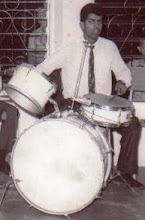

Started as a teacher in 1960 and retired as Head of Music Dept. at Maktab Perguruan Ilmu Khas, KL
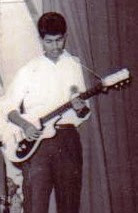
On stage 1961

Me on bass guitar

A legendary band frm Seremban that recorded 4 pop yeh2 albums
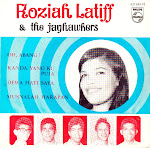
The Jayhawkers 1965 -1976

Won RTM Band Contests - 1969 (Muzik3) & 1977 Pertandingan Pancaragam

Won National Song Writing Contests

Was teaching so no long hair....also preferred jazz music
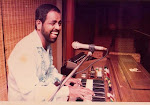
Performing in a hotel lounge - 1982 - Big band days over
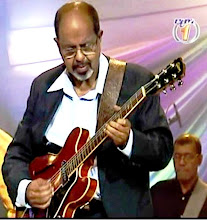
RTM Concert 2007 - on Gibson ES 330

Maktab Perguruan Ilm Khas

So comel one....my grandson looks like this a bit. So I am going to be around for a long time through him and his children/progeny.

Dashing Bachelor at Port Dickson Batu 5

Still handsome but getting top bald now.

In 2016, in my Iowa Hawkeye spirit. Still okay, Alhamdulillah.

Great fun and keeps me young

Nor & I Lead a Dynamic Team
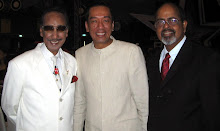
Ahmad Nawab, Ramli M.S. and Me too ke?

A TV Recording at FINAS - 2011

CAUTION: Not Recommended for the Elderly.

Holiday March 2010

Chairing an IMC Asia-Oceania Conf work session

With IMC President

In Turkish Royal Costumes

Such a beautiful place

Have vacationed in UK several times.

A unique experience with Hindu Malays

Vacation August 2007

Vacation 2006

Vacation 2005

2005

Vacation 2001

Vacation 2001

Capetown 2000

Was 93 kg then - now 83 kg just by eating less rice
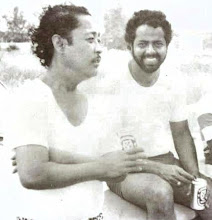
Greatest pianist I have performed with
A Musician Educator's Thought
An Entertainment Consultant

Last 22 Years
Joe Chelliah D.N.S., A.N.S., P.J.K.

My highest academic achievement came in 1986 aged 42 - M.A. ( Music)
My Wife Norhamidah

She is the best thing that has happened to me. She is still trying hard to make me a perfect gentleman.
MY CONTACTS
Link to my events business website
Blog Archive
Started as a Drummer (1960)

Joe The Cikgu Pemuzik (1960 -1996)

Started as a teacher in 1960 and retired as Head of Music Dept. at Maktab Perguruan Ilmu Khas, KL
Then took up guitar

On stage 1961
The Twilights ( 1962 -1964)

Me on bass guitar
FORMED THE JAYHAWKERS (1964 -1976)

A legendary band frm Seremban that recorded 4 pop yeh2 albums
Became a Recording Artiste in 1966

The Jayhawkers 1965 -1976
The Shades of Time on RTM - 1976

Won RTM Band Contests - 1969 (Muzik3) & 1977 Pertandingan Pancaragam
PESTA LAGU MALAYSIA 1980 - FINALIST

Won National Song Writing Contests
Tried Rock Music late 1979 - 1980

Was teaching so no long hair....also preferred jazz music
Then became a keyboardist

Performing in a hotel lounge - 1982 - Big band days over
Became a jazz band leader
Known as a Jazz Guitarist Altho' Only Jazz Influenced Guitar Player

RTM Concert 2007 - on Gibson ES 330
Retired as Head of Music Dept at MPIK, 1996

Maktab Perguruan Ilm Khas
Joe at 10

So comel one....my grandson looks like this a bit. So I am going to be around for a long time through him and his children/progeny.
HANDSOME ME IN 1968

Dashing Bachelor at Port Dickson Batu 5
That's Me Again in 2009

Still handsome but getting top bald now.
A RECENT PHOTO AS EVENTS CONSULTANT

In 2016, in my Iowa Hawkeye spirit. Still okay, Alhamdulillah.
EVENT MANAGER NOW SINCE 1993
Great fun and keeps me young
The NJEC Production Team

Nor & I Lead a Dynamic Team
Famous Musicians from 3 Eras

Ahmad Nawab, Ramli M.S. and Me too ke?
Still perform occasionally upon invitation

A TV Recording at FINAS - 2011
HORSE RIDING ANYONE?

CAUTION: Not Recommended for the Elderly.
My S. India Trip - At Cape Commorin

Holiday March 2010
IN CHINA - July 2010

Chairing an IMC Asia-Oceania Conf work session
2012 - At International Music Council(IMC) Conderence in Talinn, Estonia

With IMC President
Istanbul Holiday - 2010

In Turkish Royal Costumes
Stockholm Holiday 2009

Such a beautiful place
AT HARROD'S LONDON 2008

Have vacationed in UK several times.
In Bali 2013

A unique experience with Hindu Malays
At The Taj Mahal

Vacation August 2007
DOWN BELOW - IN MELBOURNE

Vacation 2006
IN COLUMBO'S MT. LAVANIA HOTEL

Vacation 2005
AT MACAU

2005
I LOVE PARIS

Vacation 2001
AT LONDON HYDE PARK

Vacation 2001
WITH BASKERS IN SOUTH AFRICA

Capetown 2000
WITH LONDON BOBBIES

Was 93 kg then - now 83 kg just by eating less rice
LATE 1970's - WITH THE LEGENDARY TONY SOLIANO PD

Greatest pianist I have performed with

